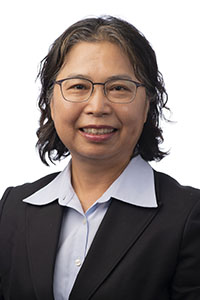
I am a Behavioral Health Scientist.
Soonhee Roh, PhD
University of South Dakota
Dr. Soonhee Roh, a tenured full professor in the Department of Social Work at the University of South Dakota, is a behavioral health scientist dedicated to addressing cancer and mental health disparities among disadvantaged populations, with a particular focus on American Indians in rural areas. Her research passions concentrate on leveraging cutting-edge technologies to transform social work practice, utilizing rigorous experimental research design to enhance service delivery and client outcomes in rural and underserved communities. Dr. Roh's expertise in randomized controlled trials (RCTs) enables her to lead evidence-based studies that drive innovative and data-driven interventions, reinforcing her commitment to advancing the field of social work through science and technology.
In addition to her work with digital tools, Dr. Roh is deeply committed to addressing the critical needs of American Indian populations, focusing on culturally responsive and sustainable interventions. Her research explores the complex socio-economic challenges faced by these communities, and she seeks to inform policies and practices that lead to equitable solutions.
Dr. Roh's dedication to these pressing issues fuels both her scholarly output and her teaching, bridging academic research with practical, community-centered social work. Her overarching goal is to advance knowledge that contributes to eradicating cancer-related and mental health disparities on both national and global scales, driving systemic change to create a healthier future for all.
This research project addresses the disproportionately high rates of cervical cancer (CC) among Indigenous women, who face the highest CC incidence and mortality in the United States and the lowest screening rates. By targeting the individual, sociocultural, and structural barriers that limit access to CC screening—such as healthcare access, stigma, and misconceptions—this project seeks to overcome the gaps left by previous interventions.
The wPap mobile app, a culturally tailored and cost-effective solution, uses SMS and MMS to deliver personalized health messages, reducing travel, wait times, and stigma while addressing specific concerns. Grounded in Community-Based Participatory Research (CBPR) and developed in partnership with the Yankton Sioux Tribe, this project offers a sustainable, innovative approach to significantly improving CC screening uptake and reducing health disparities for Indigenous women.
My research interest in cancer screening among underserved populations stems from a deeply personal experience as a caregiver for a family member diagnosed with cancer. Despite being highly educated, my family believed cancer was a distant issue, irrelevant to us, and, as a result, we did not participate in cancer screenings. By the time the diagnosis came, the cancer was already in its late stages, leading to the heartbreaking loss of a loved one. During hospital visits, I encountered other patients and caregivers who shared similar stories—limited cancer literacy, a lack of awareness about screenings, and deeply ingrained cultural perceptions that hindered early detection and treatment. This experience profoundly alarmed and motivated me.
Since joining USD, I have focused my research on cancer literacy disparities and service utilization among American Indian (AI) women, where I found many cultural commonalities with my own experience. AI communities often equate the absence of symptoms with good health, reducing the perceived need for preventive care. My growing concern about these misconceptions led me to delve into existing cancer literature, where I found limited research on cancer screening behaviors among AI populations. This gap drove me to build partnerships with tribal communities, hospitals, and health professionals to investigate how cultural beliefs shape cancer screening behaviors and how we can shift these detrimental patterns. My research is now dedicated to exploring how culture impacts interpretations of cancer and identifying strategies to improve cancer screening rates in underserved populations.
| Project Title | Grant Number | Program Director | Publication(s) |
|---|---|---|---|
| A Mobile Web App Intervention to Promote Cervical Cancer Screening among Indigenous Women |
1R01CA288301-01 |
Kelly Blake |
To request edits to this profile, please contact Mark Alexander at alexandm@mail.nih.gov.

